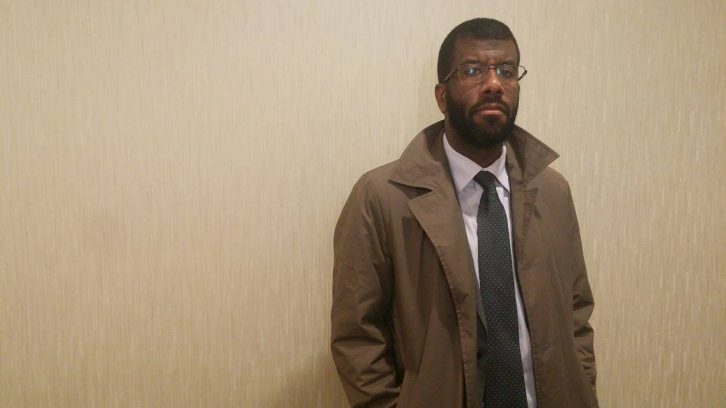
Lyle Howe (Jessica Durling, The Signal)
This column originally appeared in the Halifax Examiner on October 23, 2017.
“The Hearing Committee of the NOVA SCOTIA BARRISTERS’ SOCIETY gives notice of the disbarment of Lyle Howe of Halifax, Nova Scotia pursuant to Section 45(4)(a) of the Legal Profession Act, effective October 20, 2017 until further notice.”
In the end, the end was no surprise. The end was, in a sense, even perhaps inevitable. But, regardless of your views of the merits of the case against him, the outcome was sad. For Lyle Howe. For the legal profession. For the rest of us.
The short version: On Friday, a three-member panel of the Nova Scotia Barristers’ Society, which had earlier found African Nova Scotian lawyer Lyle Howe guilty of professional misconduct and incompetence after the longest, most expensive hearing in bar society history, passed sentence on him. It ordered Howe disbarred for at least five years and said he must pay the society $150,000 before he is allowed to even apply for reinstatement.
But the panel’s 26-page sanction decision — like its initial ruling on the merits of the case against Howe — is far more nuanced than any simple précis can capture.
While concluding there was “little evidence of actual discriminatory attack” against Howe from other lawyers, judges and court workers, the panel did find a “connection. Historical and systemic racism explain Mr. Howe’s perception and reaction to what he faced.”
It was that perception and reaction that got him into trouble.
“Mr. Howe provided the Panel with a powerful explanation of his behaviour: in summary form, he stated that his background experiences with personal racism, and the impact of systemic and historical racism have made him, at times, respond to situations as a ‘warrior.’ When he is under attack by persons and a system he sees as his oppressor, his response is to attack back. He inherently had a feeling in his mind that the system and those in it were out to get him. Thus, his response was to aggressively push back.”
Howe, a bright, ambitious young criminal lawyer who grew up on Halifax’s mean streets, had smacked up against racist attitudes in law school and believed he’d then also been overlooked in hiring by major local law firms because of his race.
As an inexperienced sole criminal practitioner, Howe set out to prove himself by taking on way more cases than he could handle. That led to sloppiness with the courts and with clients. His sloppiness got him into trouble with judges and other lawyers, which ultimately led him to what the panel concluded was a pattern of deliberate dishonesty to cover his sloppiness and “minimize his culpability.”
At one level, the bar society tried to help, appointing other more senior white lawyers to oversee his work and advise him on best practices. Howe, the panel says, resisted their efforts, in part because he saw them as part of that oppressive system, and in part because they were charging him dearly for their “services” even as they were advising him to reduce his client load.
An aside. It is not mentioned in either the panel’s original decision or in its sentencing, but the evidence shows that the lawyer and legendary African Nova Scotia human rights icon, the late Rocky Jones, did volunteer at one point to mentor Howe. But the bar society — wanting to “make sure it was somebody of sufficient seniority and knowledge of the rules of ethics and criminal defence that they could provide some solid guidance at our cost” — opted instead to ask a white woman to be Howe’s mentor. For whatever reasons, a bar society official later testified, the mentorship “didn’t work out.”
At the end of the day, the panel decided the impact of racism, real or perceived, could not overcome “the repetitive nature of Mr. Howe’s misconduct, the high level of dishonesty, a demonstrated inability to follow direction, and the fact the misconduct continued in spite of significant interventions by the society and, indeed, even during this hearing.”
The panel says it understands and agrees with Howe’s argument about “the need for the African Nova Scotian community to have access to a person from their community in the criminal justice system. This is especially the case given the over-representation of that community in the criminal justice system… As a result, the Panel has determined… we should only consider the removal of Mr. Howe from practice if that was the only option available to us to address all the appropriate principles of sanctioning. Simply put, we decided that if we could address those principles in any way short of disbarment, we should do so. Unfortunately, we have been unable to come to that conclusion.”
So Howe has now been disbarred for at least five years and required to pay costs that — while far less than the $450-600,000 the bar society had called for — make it unlikely he will ever get back his licence to practice.
Whatever the merits, the end result should be sad for all of us.
Related:
- “Who Is Lyle Howe and Why Are So Many People Saying Such Nasty Things About Him?” Part I and Part II.)
- “Guilty, but…”





 STEPHEN KIMBER, a Professor of Journalism at the University of King's College in Halifax and co-founder of its MFA in Creative Nonfiction Program, is an award-winning writer, editor and broadcaster. He is the author of two novels and eight non-fiction books. Buy his books
STEPHEN KIMBER, a Professor of Journalism at the University of King's College in Halifax and co-founder of its MFA in Creative Nonfiction Program, is an award-winning writer, editor and broadcaster. He is the author of two novels and eight non-fiction books. Buy his books